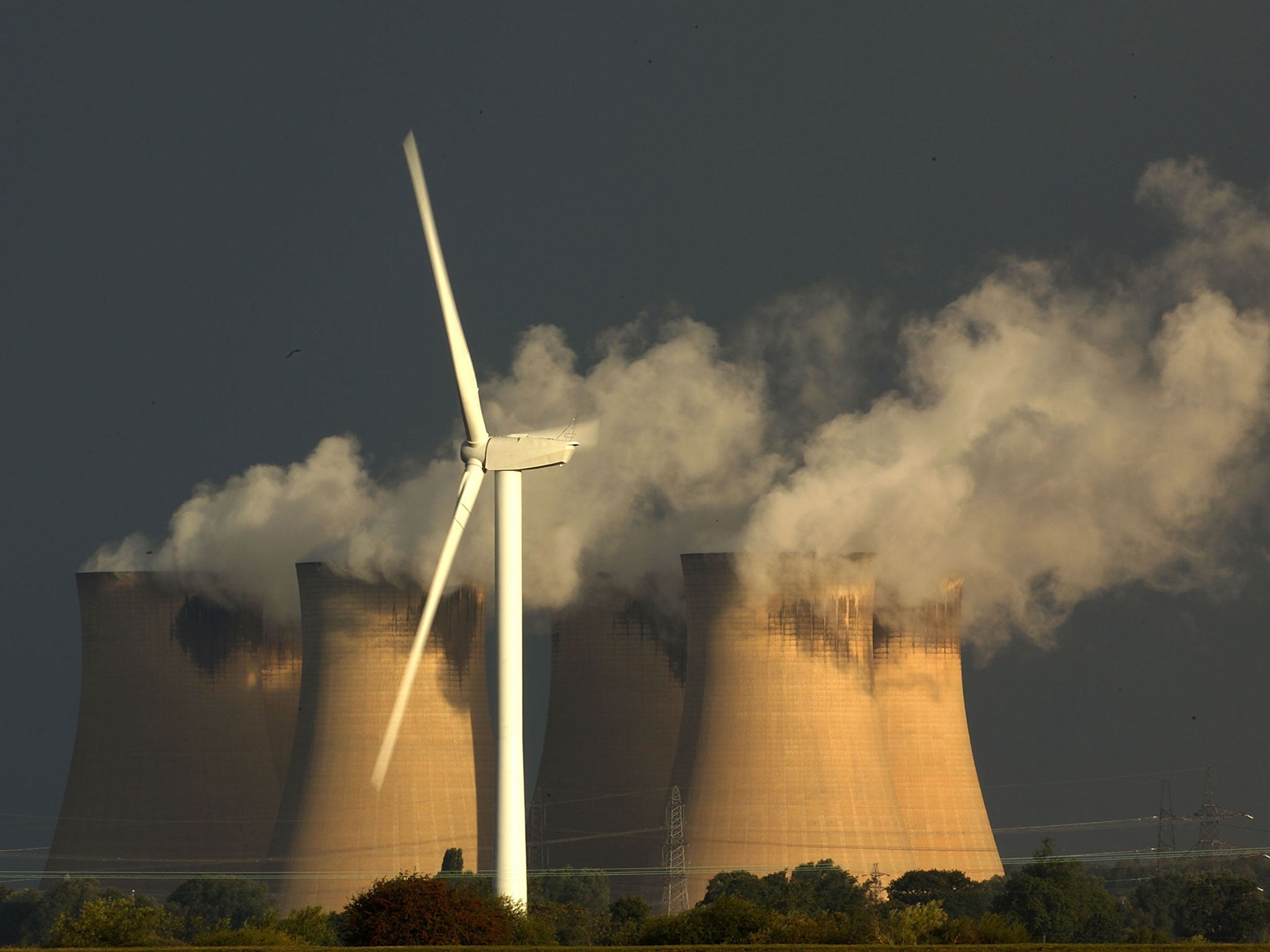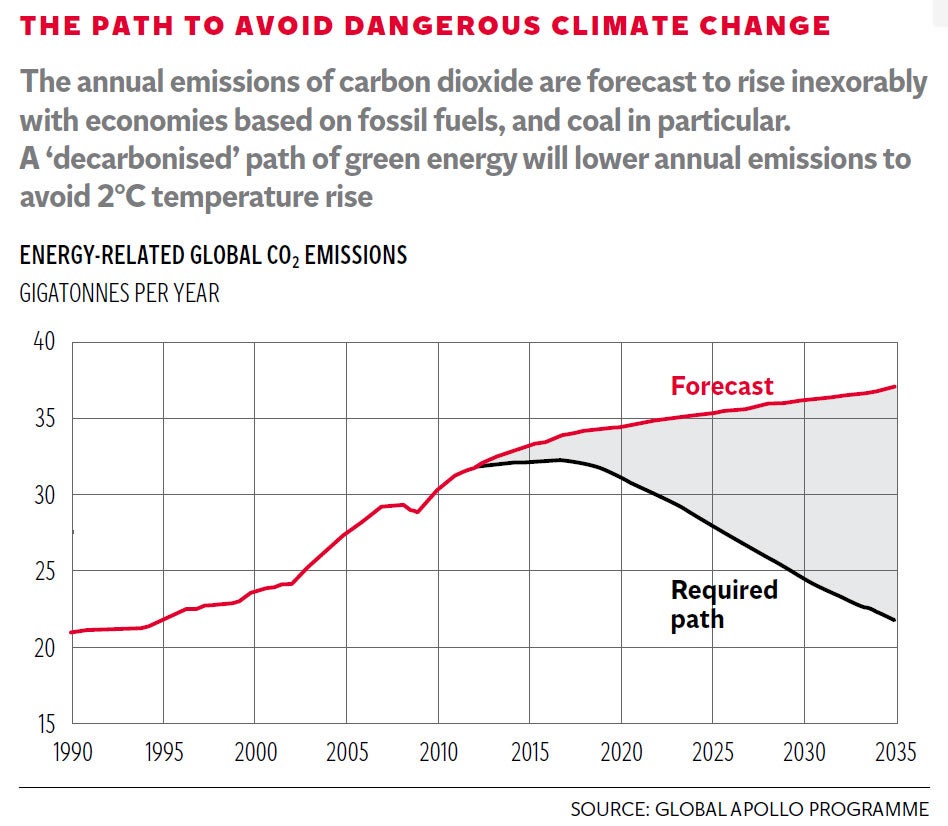Plan launched to prevent critical climate change by making green energy cheaper than coal
Academics suggest coal must be put out of business to stop global warming

Your support helps us to tell the story
From reproductive rights to climate change to Big Tech, The Independent is on the ground when the story is developing. Whether it's investigating the financials of Elon Musk's pro-Trump PAC or producing our latest documentary, 'The A Word', which shines a light on the American women fighting for reproductive rights, we know how important it is to parse out the facts from the messaging.
At such a critical moment in US history, we need reporters on the ground. Your donation allows us to keep sending journalists to speak to both sides of the story.
The Independent is trusted by Americans across the entire political spectrum. And unlike many other quality news outlets, we choose not to lock Americans out of our reporting and analysis with paywalls. We believe quality journalism should be available to everyone, paid for by those who can afford it.
Your support makes all the difference.Scientists and economists have joined forces to launch a global research initiative to make green energy cheaper than coal within 10 years, a target they believe is critical to avoid dangerous climate change. They have compared the goal to the Apollo programme of the 1960s when the United States stated that it would put a man on the Moon by the end of the decade.
Leading academics, including former government chief scientist Sir David King, past president of the Royal Society Lord Rees, and economists Lord Stern and Lord Layard, in effect said that the world cannot be saved from global warming unless coal – the dirtiest fossil fuel – is put out of business.
They have called the plan the Global Apollo Programme and hope to recruit countries from around the world in an international commitment to boost research and development into key areas of renewable energy, storage and electricity transmission.
By 2025, they hope the research will mean that wind, solar and other forms of green energy will be able to undercut the cost of burning coal to generate power, making it feasible to keep within the critical 2C increase in global temperatures needed to prevent dangerous climate change.
“It all starts with this climate-change risk we’re facing. It’s a looming catastrophe that I think can be avoided,” said Sir David, one of the architects of the programme who has been a long-term advocate of moving away from fossil fuels towards a “decarbonised” economy.
“This is a massively important global opportunity and we need to commit ourselves to action,” Sir David said at the programme’s launch yesterday at the Royal Society in London.
“To stay below 2C is going to be very challenging. We need to treat this as an extremely urgent problem. If we delay the progress towards that required pathway it will become far more painful to do so in the future,” he added.
The Global Apollo report has seven authors, including Lord Browne the former president of the Royal Academy of Engineering and ex-chief executive of BP, former Cabinet Secretary Lord Gus O’Donnell, and Lord Turner, former chair of the Financial Services Authority and the Committee on Climate Change.
It states that there is a “shocking underspend” on global research and development aimed at renewable energy – amounting to just 2 per of total global public funding on research. This needs to be boosted from $6bn (£4bn) a year to at least $15bn a year, the report says.

This would amount to each participating country spending 0.02 per cent of its gross domestic product in order to join the Global Apollo consortium and reap the fruits of the research, said Lord Layard, emeritus professor of economics at the London School of Economics.
“This challenge is at least as big as the challenge of putting a man on the Moon…. We believe that is an absolute minimum to crack this problem. The good news is that we are seeing this technological progress. The bad news is that it’s simply not fast enough,” Lord Layard said.
Lord Stern, who headed a major government review into the economics of climate change, said that the current cost of coal is about $50 a ton, although the true costs in terms of environmental damage and impact in human health is probably nearer to $200 a ton.
The next 20 years will see major changes to the way people around the world live, which presents problems as well as opportunities for new technological breakthroughs that will make renewable energy more competitive, Lord Stern said. “How we build our cities and our transport, and how we build our energy systems over the next 20 or so will fundamentally determine our chances of holding to within 2C,” he said. “This is an idea whose time has come. Indeed this is an idea that cannot be postponed.”
World leaders agreed in 2010 that it was important to limit global temperature increases to 2C which would mean keeping atmospheric carbon dioxide concentrations to within 450 parts per million.
However, the burning of fossil fuels, and coal-fired power stations in particular, has resulted in carbon dioxide emissions continuing to increase, with concentrations reaching 400ppm with no signs of abating. Meanwhile, global energy demands are expected to rise by a further third by 2035.
“The average temperature is already 0.8C above the pre-industrial level,” the Global Apollo report says.
“If it rises to over 2C above that level, there will be serious environmental consequences for billions of people – including increased droughts, floods and storms. Millions will lose their livelihood and have to migrate,” it says.
The Global Apollo Programme aims to put coal out of business by making renewable sources of energy, such as solar and wind power, cheaper at generating electricity. The architects of the 10-year programme have identified six key areas where improvements in technology can make green energy more efficient and cost effective. They say three of these will be critical:
Apollo’s creed: Three key targets
Renewables
The worldwide, publicly-funded research and development of renewable sources of energy, such as wind and solar, is estimated to be around $6bn (£4bn) a year. This compares to $101bn spent on annual production subsidies for renewables and $550bn in subsidies for the fossil fuel industry. Research and development could dramatically change the economics of solar energy, for instance, given that the Sun provides 5,000 times more energy to the Earth’s surface than our total human demand for energy. The cost of solar panels, which convert sunlight directly into electricity, has fallen dramatically from just under $10 (£6.60) in 1992 to less than $0.50 today. Wind energy costs are falling more slowly, but this could be transformed with further innovation, the report says.
Electricity storage
Both wind and solar energy are intermittent generators of electricity. If spare electricity generated when the sun is shining and the wind is blowing can be stored for when it is needed on cold nights and windless days, this would help make these renewables more cost effective. The Global Apollo Programme identifies much-needed research into batteries, thermal storage, compressed air, fuel pumps, flywheels, molten salt and pumped hydro-electricity and hydrogen fuel, as the key goals for improving energy storage.
Smart grids
More efficient transmission of electricity by balancing supply and demand more carefully, and improving electricity grid software, could dramatically reduce the unnecessary losses. A major obstacle in the deployment of renewable energy beyond 30 per cent of the grid power is the poor integration of current electricity grids. Smart grids could improve this, and so make green energy more efficient and cost effective.
The report's authors
Sir David King
Former UK Government Chief Scientist (pictured right).
Lord Browne
Former President of the Royal Academy of Engineering, and former CEO, BP.
Lord Stern
IG Patel Professor of Economics and Government, LSE. Chair of Grantham Research Institute on Climate Change and the Environment.
Lord O’Donnell
Chairman, Frontier Economics, former UK Cabinet Secretary (below right).
Lord Rees
Astronomer Royal and former President of the Royal Society and Master of Trinity College, Cambridge. Emeritus Professor of Cosmology and Astrophysics.
Lord Turner
Senior Research Fellow, Institute of New Economic Thinking. Former Chairman of the Financial Services Authority and of the Committee on Climate Change.
Lord Layard
Director of Wellbeing Programme, LSE Centre for Economic Performance. Emeritus Professor of Economics.
Join our commenting forum
Join thought-provoking conversations, follow other Independent readers and see their replies
Comments